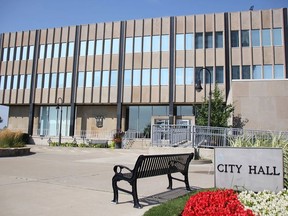Article content
Replacing every piece of publicly owned infrastructure, including every sewer pipe, sidewalk, tree, bridge, park bench, city owned vehicle and building in Sarnia, would cost about $4.3 billion.
Advertisement 2
Article content
That’s the bottom line in the city’s new corporate asset management plan, a provincially required inventory of everything the city owns, its condition and replacement value.
Article content
The plan is aimed at helping Sarnia make investment plans to replace older and failing infrastructure, like water and sewer pipes that date back to the 1950s and expected to cost hundreds of millions of dollars to replace in the next few decades.
Most city assets are in poor, fair or good condition, and are neither pristine nor facing imminent failure, a report from a committee including senior city management says.
But some are, it notes, referring to a 2022 asset management assessment pegging “core” assets such as water pipes and roads at $2.4 billion, and estimating then about $381 million were in “very poor” condition and in need of repair.
Advertisement 3
Article content
“That challenge is becoming more relevant as the assets we have are getting to the end of their life,” said Sarnia engineering and operations manager David Jackson.
In 2025, Sarnia is required, under Ontario’s Infrastructure for Jobs and Prosperity Act, to come up with an asset investment plan, using data from the asset management plan to help guide that decision-making process, he said.
“So, it is just forcing us to make a conscious decision now, about what level of service we want, rather than wait until the last minute and everything is falling apart,” Jackson said.
“The decision might be we accept a lower level of service to keep taxes or rates low,” he said. “But at least we’re making that decision consciously and knowing what the impacts are.”
Advertisement 4
Article content
The plan notes Sarnia budgeted about $60 million this year for capital spending, its share in the Lambton area water supply system (LAWSS), and its fleet reserve, along with things such as tree planting, counted in the operations budget but considered a capital expense, Jackson said.
The yearly target to maintain current levels of service in the city is $79 million, the report says.
“Obviously, you’re not going to raise taxes that much in one year,” Jackson said.
“This kind of leads to that discussion of what is our long-term strategy.”
Pursuing federal and provincial grant money is also key, he said, along with balancing infrastructure maintenance costs with how affordable the city is when it comes to taxation.
Advertisement 5
Article content
“It’s really long-term decisions we’re making,” he said.
Public input is expected in crafting that investment plan next year, the city report says.
And while the report is granular in its detail in most aspects, there’s still some room for data improvement, Jackson said.
Not quite one-third of the city’s estimated 90,000 trees have been fully inventoried for example, and storm sewer outlets haven’t been fully assessed in the report.
“It’s still a very high-level estimate,” Jackson said.
“The numbers will fluctuate as our data improves, as we improve the quality of the estimates we’ve used for replacement value.”
Yearly plan updates come to city council and the policy and plan are reviewed and updated every five years, the city report says.
Advertisement 6
Article content
Of note, the asset management plan includes police headquarters, valued at $60 million, but not police fleet and equipment, which are managed by the police services board.
Among the data points in the plan, the city has:
•492 park benches in good condition, on average, and valued at $738,000.
•70 parking lots — half paved — valued at nearly $17.8 million, and without an average condition specified.
•463 bus stops in good condition, on average, with a $323,000 replacement cost.
•12 emergency management sirens valued at $100,000 and in poor condition, on average.
•8.4km of city-owned shoreline, valued at $125 million, average condition unspecified.
•8,161 street lights — 97 per cent LED, 52 per cent with photocell technology — valued at nearly $3.2 million and with an unspecified average condition.
The report notes replacement values are in 2023 dollars, where possible.
Article content

